|
13-14 Queen Street
Dover
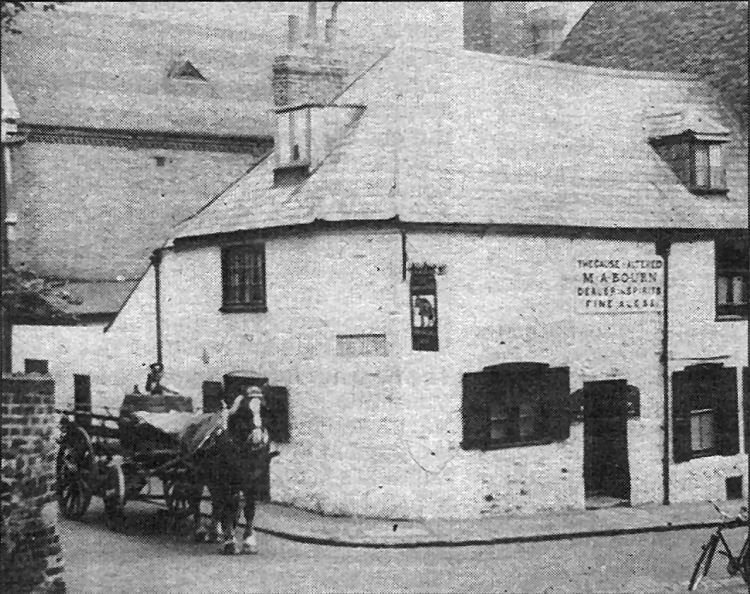
The Cause is Altered, date unknown. |
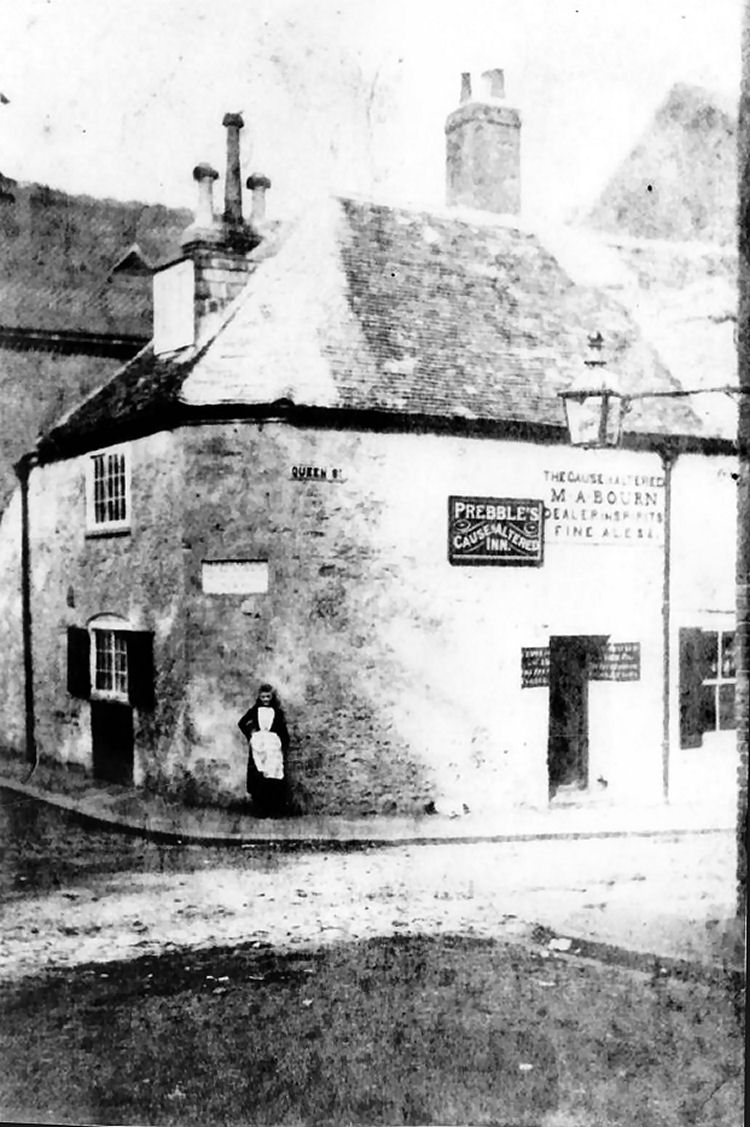
Above photo taken September 1891, showing a lady from the Prebble family. |
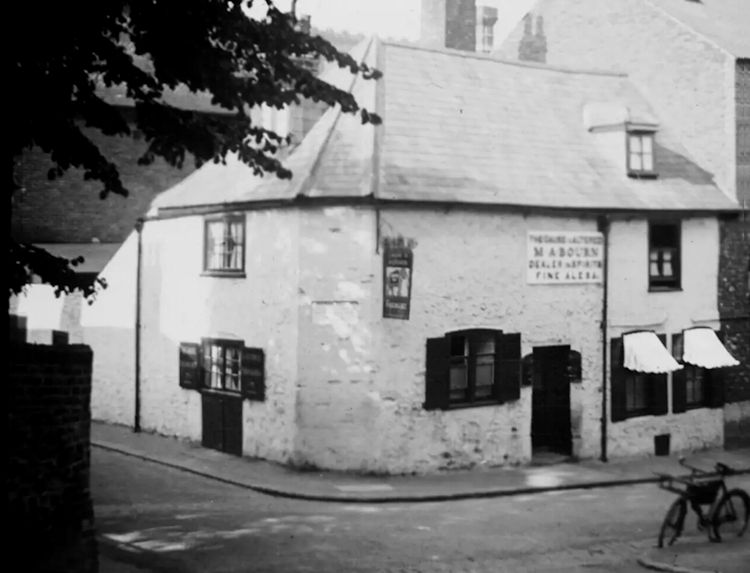
Above photo, circa 1931, kindly sent by Rory Kehoe. Showing as a
Fremlin's pub, which it remained until 1967, when Whitbread's took over.
Up until 1926 the pub had been an Alfred Leney's Phoenix Brewery tied
house but in that year, all Leney's pubs were leased to Fremlin's, as
the two companies effectively merged. The Leney and Fremlin families
were closely related and after the merger, the newly-enlarged company
was run by Alfred and Claude Leney, acting as Chairman and Managing
Director, respectively. |
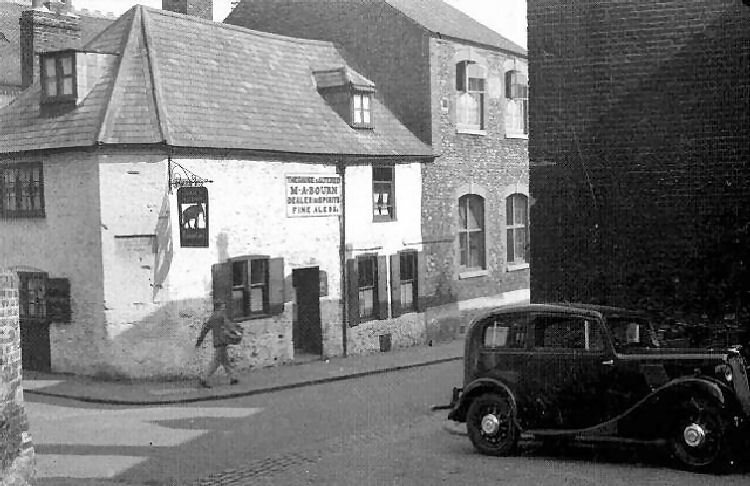
Date circa 1950, kindly supplied by Kevin Healey. |
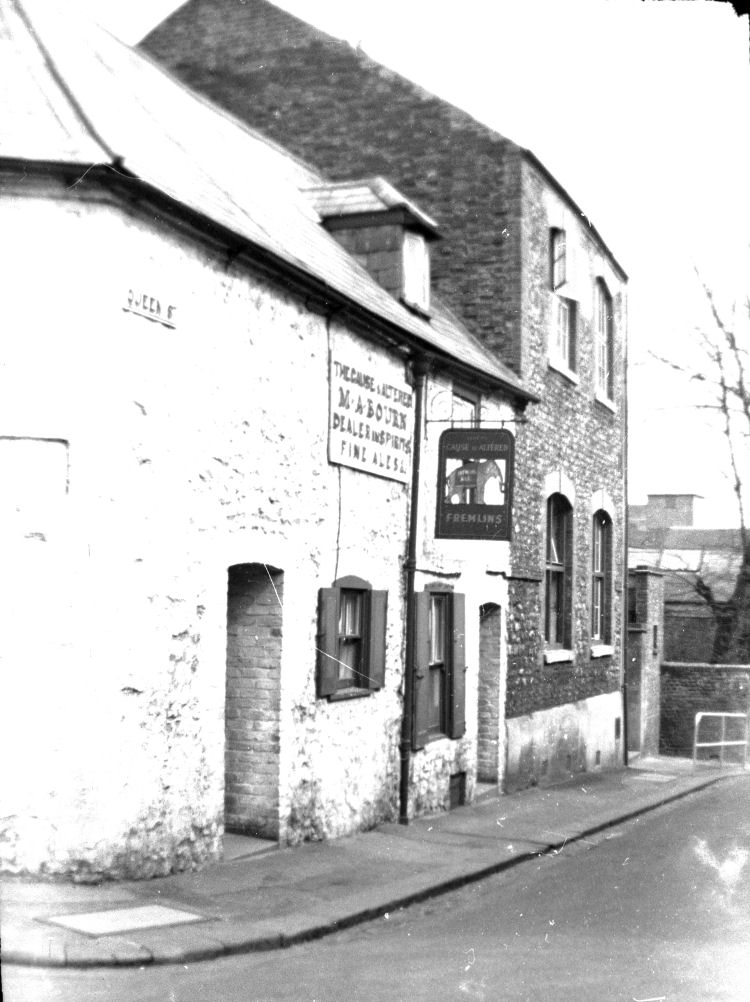
Above photo kindly taken and sent by Norman Clark, circa 1955.
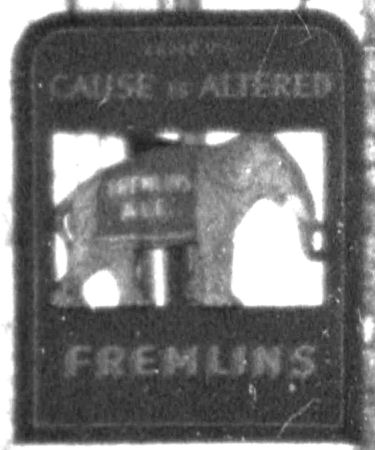
Sign taken from above photo. |
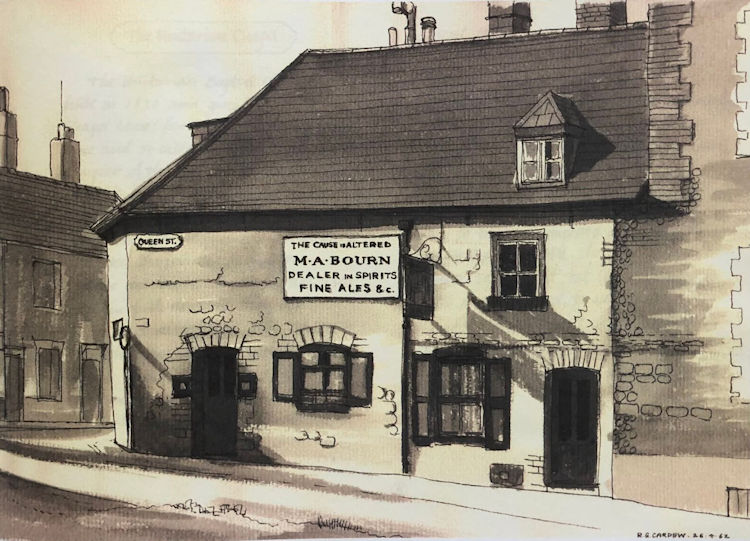
Above painting by Geoffrey Cardew, 1962. |
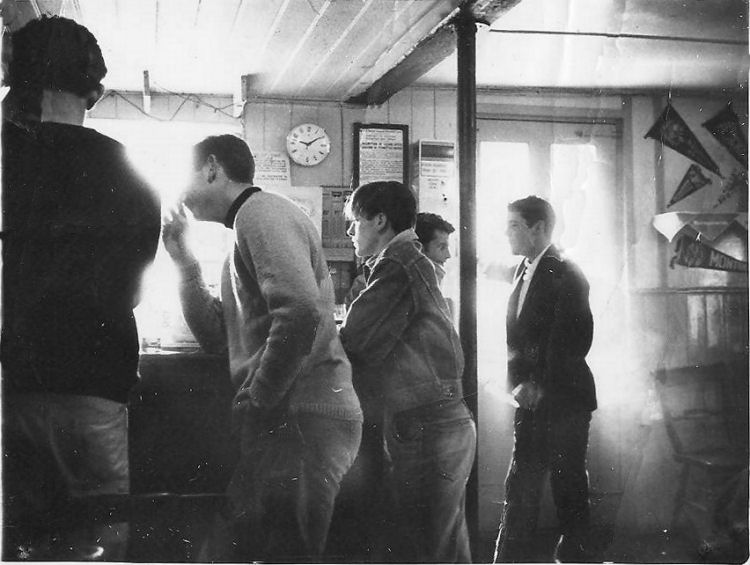
Photo supplied by Susan Stewart who says the reverse says "Cause is
Altered, 1968, 13.48 hours." |
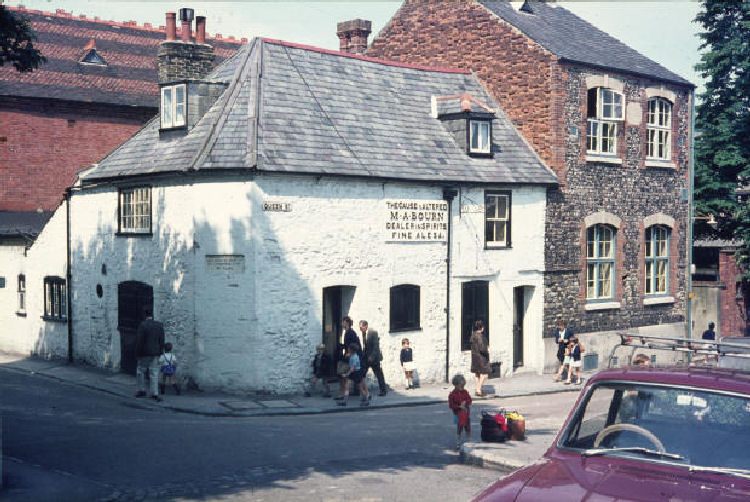
Date circa 1970, kindly supplied by Kevin Healey. Showing Kevin and
his dad walking past on the very left. |
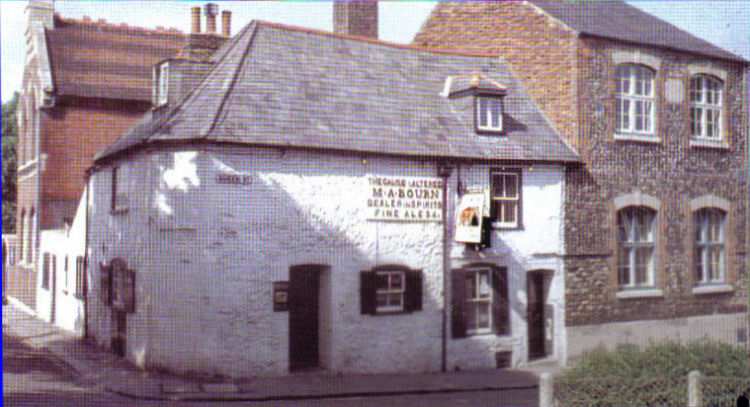
Above photo of the Cause is Altered, date unknown.
|
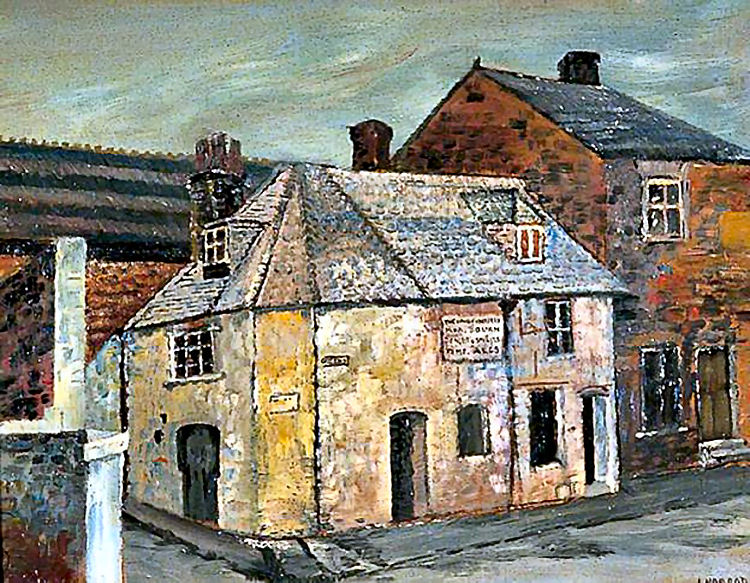
Above painting date unknown. |
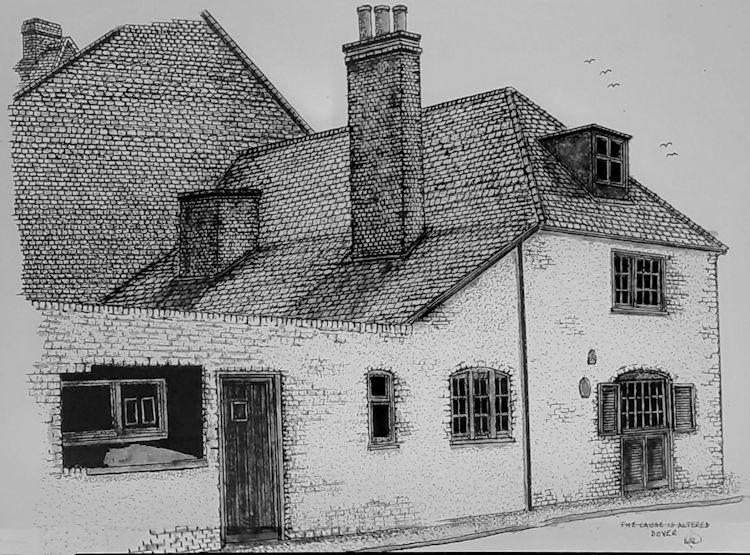
Above print, date unknown. |
|
Known previously as the "Blacksmith's Arms" and later as the "Carpenter's
Arms", it was the property of Whitbread's at the close took over
from Mackeson in 1967.
On the corner with Princes Street, it was licensed prior to 1826 what it
is said it acquired it's name and was
said at the end to be at least three hundred years old. It was reputedly
part of the local smuggling chain at one time and an underground tunnel was
said to connect it with at least one other pub in that connection. John
Bavington Jones' "Dover" writes:- An old inhabitant told us that he saw the
sign fixed there before he went to sea, in the year 1826. Being situate on a
lonely spot on the Town Walls, it was a great resort of smugglers, but when
Mr. Bourne took the house, at the beginning of the nineteenth century, he
resolved to make a change for the better and put up a new sign "The Cause is
Altered." However, I believe this to have been done prior to Bourne having
the place, perhaps by his predecessor, Andrew Watts, as the Pigots directory
of 1832 shows it in his reign and under that name.
It stood just inside the town wall at Cow Gate and a stone in the wall of
the pub informed the public that the gate was removed in 1776.
|
|
From Kentish Gazette 20 October 1835.
DOVER, OCT. 19.
This morning an inquest was held at the sign of the "Cause is
Altered,"
before John Shipdem, Esq., Mayor and Coroner, Dover, on view of the body
of William Beer, who, on Saturday last, poisoned himself by taking a
quantity of arsenic. It appeared that as soon as it was ascertained that
he had taken arsenic, Mr. Rutley, the surgeon, was sent for, who used
the stomach pump with every prospect of success for a considerable time,
but the quantity taken baffled all skill and perseverance, as the man
died about three o'clock on the morning of Sunday. It being clearly
proved to the satisfaction of the jury that Beer had for the last six
months been in a low, desponding way, they returned a verdict that "The
deceased had poisoned himself while in a temporary state of
derangement." |
|
From the Dover Telegraph and Cinque Ports General
Advertiser, Saturday 27 May, 1854. Price 5d.
DOVER PETTY SESSIONS
Mary Ann Bourner, of the "Cause is Altered," was
fined 10s. and costs, for having her house opened on Sunday, the 21st,
before the hour allowed by law.
|
|
South Eastern Gazette, 01 January 1856.
Felony.
Yesterday week, at the Police Court, Isaac Hughes, labourer was charged
with stealing £1 1s. 6d, the property of John Upton his fellow lodger at
the "Case is Altered" public house. It appeared that both men slept in
the same room, and on the previous Saturday night Upton had two half
sovereigns and 1s. 6d. in a porte monnaie in his trousers pocket when he
went to bed, but on the following morning the whole amount was gone. The
police was then applied to, and the missing property was found,
concealed in the lining of the prisoners cab.
Committed for trial.
|
|
The owners and suppliers changed hands in 1859 after Thomas Walker sold off the Phoenix
brewery to Leney's.
Supplied by Alfred Leney Co Ltd, who bought out Thomas Walker's
Phoenix Brewery in 1859 and registered as such in 1896, until bought out
by Fremlin Brothers brewery of Maidstone in 1926, brewing at the Dover
brewery ceased in 1927.
|
|
Maidstone Journal and Kentish Advertiser, Saturday 16 July 1859.
To let by tender.
The following public houses situate in and near Dover, Eastry, and
Folkestone, viz:-
1. The "Bull Inn," Eastry.
2. The "Halfway House" and land, on the Dover and Canterbury Road.
3. The "Chequers," at Folkestone.
4. The "Chequers" and land, at West Hougham.
5. The "Red Lion," at Charlton.
6. The "Fox," in St James's Street.
7. The "Ordnance Arms," in Queen Street.
8. The "Cause is Altered," in Queen Street.
9. The "True Briton," on Commercial Quay.
10. The "Three Kings," in Union Street.
11. The "Fleur-de-Lis," in Council House Street.
12. The "Cinque Port Arms," in Clarence Place.
13. The "Red Lion" in St James's Street.
14. The "Dolphin," in Dolphin Lane.
The above houses are to be let as free houses, in consequence of the
proprietors of the Dolphin Lane Brewery discontinuing that business.
The holdings of the present Tenants expire under notice to quit, as follows,
viz:- No. 2, on the 6th January next, No. 3, on the 6th July, 1860, No. 10,
at Lady Day next, No. 13, on the 23rd October next, No. 14, on the 6th April
next, and reminder on the 11th October next.
Tenders must be sent into the offices of Mr. Edward Knocker, Castle Hill,
Dover, on or before the 20th day of July next, marked on the cover "Tender."
Particular and Terms of hiring, with the forms of Tender, to be obtained on
application to Mr. knocker, or Mr. Thomas Robinson, Estate Agent, Bench
Street, Dover.
Tenders may be given for the whole together or separately. The Tenders will
be accepted subject to the houses being sold on or before the 20th day of
September next, and the proprietors do not bind themselves to accept the
lowest or any tender.
N.B. The proprietors are open to treat for letting the Brewery, Malthouse,
and Premises, in Dolphin Lane.
Edward Knocker. Castle Hill, Dover, June, 1859.
|
|
From Dover Express, Saturday, January 25, 1862; pg. 4; Issue 182.
ATTEMPTED SUICIDE AT DOVER.
On Wednesday evening last Mr. George Bourne, a plasterer by trade,
and son of the landlady of the "Cause is Altered," Queen Street, attempted
to put an end to his existence by shooting himself. The wretched young
man is but twenty-six years of age, and has not long been married. There
is no doubt that the rash act was premeditated, but the causes which led
to its execution are at present involved in mystery. Until very
recently, Bourne has carried on the "Old Post Office Inn," in Snargate
Street, but on Monday last, as will be seen by our police report of that
day, he transferred his license to another person, and it appears that
for the last few weeks he has been occupying lodgings, with his wife, at Maison Dieu Terrace, Charlton. It was not here, however, that his insane
attempt upon his life was made, but at the house of his mother, where he
went on the evening of the deplorable occurrence, apparently in his usual
spirits. Requesting to be supplied with a glass of brandy and water,
which was brought to him, he sat down in the bar parlour, where he was
left alone for some time. During this time he must have written a
letter, and addressed it to his wife, as such a document was found when
the alarm caused his suicidal attempt brought persons to the room, and
writing materials, it appeared, had been recently used. The contents of
this letter have not transpired, nor have we been able to ascertain
whether it refers in any way to the cause of the terrible deed, but it
is believed that the wretched man laboured under some sense of
injustice, for on his being taken to hospital and being asked how he
could have committed such an act, he said he should not have done so "if
they had behaved differently." The weapon with which the attempt was
made was a small pocket pistol, but whether it was loaded with ball, or
simply contained a wad and a charge powder, seems at present doubtful.
It is stated, however, that no ball has yet been extracted. To
accomplish his direful purpose, he must have placed the muzzle of the
weapon close to his forehead, a portion of the skull being blown away
and the contents of pistol having penetrated some distance into the
brain. Previous to the occurrence he had been drinking, but to what
extent does not appear. At the hospital every possible attention has
been paid to the injured man; but he still lies in the most critical
state, and it is very problematical if he will recover. |
|
From the Dover Express and East Kent Intelligencer, 15
February, 1862.
THE RECENT ATTEMPTED SUICIDE AT DOVER
This morning more than the usual interest attached to the proceedings
of the Borough Magistrates, owing to the young man George Bourne, whose
attempt upon his life by discharging a pistol at his head we recorded a
few weeks since, being placed at the bar to answer for the offence.
Since the period of his rash attempt the prisoner had been under
medical treatment at the Hospital, and he has now almost entirely
recovered from the effects of the injuries inflicted, which were at
first feared to be fatal. On being placed at the bar he looked around
the Court without betraying any remarkable perturbation. His face was
pale and he wore a bandage around his head, but in other respects he
presented his usual appearance.
The charge having been read to the prisoner, the following evidence
was called:-
Mathew Henry Jones: I am a labourer and I live at Chapel Place. on
Wednesday, 22nd January, I was at the "Cause is Altered," a public-house
kept by the prisoner's mother, Mrs. Bourne. I had not been there many
minutes before I heard a report, and immediately afterwards Mrs. Bourne
ran into the room and asked if anyone would come and assist her. She
said there was a report of a gun and that her son George was in the next
room. The door of the adjoining room was shut, but on opening it I found
the prisoner lying on the floor, on his back.
At this stage of the proceedings Mr. J. C. Ottaway, who was present
at the medical attendance of the prisoner, asked that the prisoner might
be accommodated with a seat. The Magistrates at once complying with the
request, a chair was placed inside the dock, and the prisoner sat down.
Some cold water was also brought with which the prisoner bather his head
at intervals.
Examination of Jones continued: I got into the room as quickly as I
could, and picked prisoner up and as soon as another man came to my
assistance I sent for the police.
The Magistrates' Clerk: Just describe the state in which you found
the prisoner, when you went into the room?
Witness: When I went into the room he was lying on his back, and was
"smothered" in blood, which was flowing from his head, over the eyes. We
searched for the weapon which had caused the wound, but could not at
first find it. A pocket pistol, however, was afterwards found in my
presence and given to the police-constable Irons. Medical assistance was
immediately sent for, and Mr. Drew and Mr. Walton attended.
Captain Smithett: Was any other person in the room in which you found
the prisoner as described?
Witness: No, Sir.
Examination continued: I raised the prisoner's head and rested it
between my knees. He did not speak for a few minutes, and I did not say
anything to him till I had searched his pockets. In the right hand
pocket of his coat I found a bullet.
Captain Noble: Any powder?
Witness: No.
Examination continued: I then asked the prisoner why he had done it,
and he replied, "Because the whole of my family is against me." He also
said he intended to put himself out of the way. That is all he said.
Magistrate's Clerk (to prisoner): Do you wish to ask the witness any
questions?
Prisoner: Yes. (To witness.) How long was it after you heard the
report that my mother asked you to come into the room?
Witness: Not two seconds.
Prisoner: Did she not serve someone with some beer in the interval?
Witness: No.
Prisoner (to the Court): That is a story. I should like my mother to
be called. (To the witness.) You say she particularly asked you to come
in?
Witness: No, not me in particular.
Captain Nobel (to witness): I understand you to say she came and
asked the people generally who were in the room?
Witness: Yes. I was near the door. Only myself and another man were
in the room. Mrs. Bourne came in almost as soon as we heard the report
of the pistol.
William Payn: I am a shoemaker, and live at 6, Mount Pleasant. I was
at the "Cause is Altered" on Wednesday, the 22nd January, between 9 and
10o'clock in the evening. I heard a faint report. It did not sound like
the report of fire-arms, but resembled more the bursting of a
ginger-beer bottle. In a few seconds Mrs. Bourne came into the room, and
in consequence of what she said I went into the adjoining room,
accompanied by a man named Jones (the last witness. We opened the door
and found the prisoner lying on his back with his feet extended towards
the entrance. His face and shirt were covered in blood, which was
flowing from his head. I left Jones in charge of the prisoner, and went
for the police. I also went for Mr. Drew, surgeon, and when I returned
to the "Cause is Altered" I found the prisoner sitting in a chair. I
asked him if h knew me. He said, "No, I don't know you; who are you, old
fellow?" I told him my name, and he then said, "There's one thing I wish
you would do. I have not long to live. Will you fetch me a glass of
brandy and water?" I told him "No; but some one fetched it, and he had
it. I cannot say who fetched it.
The Magistrate's Clerk: Was that before any doctor came?
Witness: Yes, Sir.
Examination continued: When the doctor came he dressed the wound. On
the bandage being placed round prisoner's head he complained of its
being tight, and said if they did not loosen it he soon would, and
threatened to rip it off. The police then searched in his pockets, and
found in one of them a large sized penknife. The would was in the front
part of the head, between the eyes. Some time after I had got back to
the house, the policeman enquired for the pistol, and I found it on the
ground. I felt it against my foot. The pistol produced by
police-constable Irons, to whom I handed it, is the same. The prisoner
was afterwards removed to the hospital.
Magistrates' Clerk (to prisoner): Have you nay questions to ask this
witness?
Prisoner: No, Sir.
Capt Smithett, on the evidence of Payn being read over, remarked that
the witness had stated that Mrs. Bourne entered the room he was in,
saying that her son had come into the house in an excited state and had
asked for pen, ink and paper.
The Magistrate's Clerk said this was not evidence, and he had
therefore not taken it down.
Thomas Irons: I am a police-constable of the borough. In consequence
of information I received I went to the "Cause is Altered" on Wednesday,
the 22nd of January, about ten o'clock at night. On going into the back
room I saw the prisoner sitting on the floor, supported by the witness
Jones. There was a huge quantity of blood behind him on the floor, and I
noticed a strong smell of exploded gun-powder. I searched the room and
the prisoner's pockets, but could find no fire-arms. In one of the
pockets, however, I found three bullets and also, on the table, beside
the pen and ink, a letter I now produce.
The letter, which was read by the Magistrates' Clerk, was as
follows:-
"Dear wife, - Pay all debts contracted since I have been home from
America. Good bye."
And on the back of the envelope were the words-
"I built this room. I might as well die here."
Examination resumed: The prisoner was blooding from a wound between
the eyebrows. Mr. Drew and Mr. Walter afterwards came, but the wound
was not dressed in my presence. I left shortly after the medical men
came. I helped Jones and Mr. Drew life the prisoner into a chair. The
last witness was present. Mr. Drew said "There is the pistol," pointing
to the spot where the prisoner had been lying, and the witness Payn
picked up the weapon and handed it to me. I afterwards examined the
pistol, and it appeared to have been recently discharged. An exploded
cap was upon it. I also produced the bullets I found in the prisoner's
pocket.
On the bullets being examined, they were found to correspond with the
bore of the weapon produced by the constable.
James Cuthbert Ottaway: I am a fellow of the Royal College of
Surgeons, and am residing and practising in Dover. On the night of
Wednesday, the 22nd of January, shortly after twelve o'clock, I received
a message from Mr. Drew informing me of the injury the prisoner had
sustained, and I saw prisoner on the following morning at the hospital.
On examination I found a would perforating the skull just between the
eyebrows. On the occasion of my next seeing him, a day or two
afterwards, in company with another surgeon, I made a careful search for
what I apprehended to be a bullet. I passed my finger directly through
the skull to the extent of an inch and a half, or more, but I could find
no bullet. The prisoner has progressed satisfactorily from that time to
the present, and is now considered out of danger from the effects of the
wound.
Captain Noble: I suppose it would not be possible for the ball to
have dropped out in moving the prisoner about, after it had perforated
the skull?
Witness: No, I believe not.
Magistrates' Clerk: Was the prisoner sensible when you first saw him?
Witness: Yes, to a certain extent.
Magistrates' Clerk: Did you pout any questions to prisoner?
Witness: I am not aware that I put any particular questions.
Magistrates' Clerk: Did you ask him anything as to the act?
Witness; No I did not.
Magistrates' Clerk: Did you hear any one do so?
Witness: No.
Magistrates' Clerk: No bullet has been found?
Witness: Not to my knowledge.
Magistrates' Clerk: Would it be possible for such a wound as that
inflicted on the prisoner be occasioned simply by the explosion of a
pistol, without it containing some projectile?
Witness: No, I think not.
Magistrates' Clerk: Was it a clean, round hole, or did the skull
appear to have been smashed in?
Witness: It was a clean, round hole, sufficiently large to admit my
little finger to the second joint. At the part of the head where the
wound was inflicted the skull is two or three times as thick as at other
places.
Magistrates' Clerk: Is it possible for a bullet to remain imbedded in
the skull for any length of time without being life sacrificed?
Witness: Yes, cases are not infrequent in which bullets have remained
for years inside the skull, without inconvenience arising.
Sergeant Geddes, of the Dover police force: On Wednesday, the 22nd
January, I found the prisoner at the house of his mother. Two constables
were present, and Mr. Drew and Mr. Walter, surgeons were also in
attendance. When I entered one of the doctors had just bound up the
prisoner's wounds, the prisoner was sitting in a chair. I assisted to
take him to the hospital, where I left him in charge of the doctors. A
constable was also left in attendance. I produced a pistol I found at
the "Masons' Arms," Charlton, which
corresponds with the weapon which has been produced by police-constable
Irons.
On being asked if he had any questions to put to this witness,
prisoner enquired what had become of the penknife taken away from him?
Police-sergeant Gedds then produced the penknife saying he took it
from the prisoner's pocket in consequence of his threatening to rip the
bandages off his head if it was not taken off.
Henry Eastman: I am the landlord of the "Masons'
Arms" public-house, High Street, Charlton. On the 22nd January the
prisoner was in my house from eleven till one o'clock, and afterwards in
the afternoon. He read the newspaper in the morning. In the afternoon he
came in with my son, and suggested that they should go and have a shoot
with a pair of pistols he had given me to take care of for him on the
previous day. The prisoner and my son then went and practised at my
target, and on their return the prisoner gave me what I thought were
both pistols, wrapped up in a piece of paper, with powder, &c. The same
night, about eleven o'clock, sergeant Geddes called at my house and
asked me if I had a pistol. I told him I had two, and went up stairs to
fetch down the parcel the prisoner had handed me in the afternoon. It
was in the same state as when the prisoner gave it me, and on its being
opened, only one pistol was found.
This was the whole of the evidence, and the prisoner having been
charged with attempting to commit a felony by attempting to destroy his
life with a pistol, was asked if he had anything to say in answer to the
charge previous to his committal for trial.
Prisoner then made the following statement, which was taken down in
writing:- In the afternoon of the 22nd January I went into Eastman's and
had a shoot at the target. Three of us were shooting at the target, and
afterwards drank a pot of beer indoors. I loaded all the pistols, and
before they were wrapped up I put one in my pocket unintentionally. I
did not know, on leaving, that Mr. Eastman had not got both the pistols.
I went home between 4 and 5, or between 5 and 6, I cannot say which, and
between 6 and 7 I came out again, and went down the street. As I was
going along, I put my hand into my pocket for a cigar, and I found the
pistol there. I met several, and went into several places, and had
something to drink. I can remember going into Hammond's, but I did not
know what I did there. From his house I went to my mother's, where I
asked for a pen and ink, and I there had some brandy and water. I
recollect taking out the pistol and laying it on the table, and I
suppose I took it up and it went off: but I had no intention of shooting
myself.
The prisoner was then asked if he desired any witness to be called?
He at first declined to call any one, but subsequently called on Mr.
Hammond, who was in the body of the Court, and who then stepped into the
witness box. He said: My name is Thomas Hammond, and I am a mariner. I
live at the "Mogul Tavern," in Adrian
Street. I was in company with the prisoner on the afternoon of the 22nd
January, firing at the target, at Eastman's. We were firing for half an
hour, from three till half-past. No one but Bourne loaded the pistols. I
did not see what he did wit them, but he seemed to roll them up, and I
thought he gave them to Mr. Eastman. After having a pot or two of beer,
I went away, about six o'clock, leaving Bourne still in the house. About
eight o'clock prisoner came down to our house, where he remained till
nearly ten. During the time he was there he had three or four glasses of
brandy and cloves. About ten minutes after he had left, I heard that he
had shot himself.
Magistrates' Clerk (to prisoner): Do you wish to ask this witness any
more questions?
Prisoner: Was I the worse for liquor when I was at your house, Mr.
Hammond?
Witness: Yes, you were not sober.
The Magistrates then formally committed the prisoner for trial at the
next quarter sessions, and the several witnesses were bound over to
attend and give evidence.
Previous to his removal in custody, the prisoner made application to
be admitted to bail, and was informed that his request would be complied
with, provided he found two good and reasonable sureties in £50 each and
entered into his own recognicance's for £100, twenty-four hours notice
to the proposed sureties to be given to the police.
The prisoner who did not appear to be ready at that moment to offer
any securities, was then removed; but before he was taken away the
Magistrates ordered that any papers found upon him at the time of his
arrest which did not relate to the present charge might be returned to
him.
We have since learned that bail has not been obtained. After his
committal on Wednesday, the mother, wife, and sister of the prisoner
applied to the justices to have him bound over to keep the peace towards
them, but the Magistrates referred him to a solicitor.
No other business has since transpired before the Borough bench.
|
|
From the Dover Express and East Kent Intelligencer, 3
February, 1866.
FAMILY JARS
George Bourne, a plasterer, was summoned for assaulting his sister,
Susannah Prebble.
It appeared that the defendant was living with his mother, who keeps
the "Cause is Altered" public-house, in Queen Street, conducting the
business on her behalf, and that the misunderstanding out of which the
present charge arose took place upon the complainant going to her
mother's house.
The defendant, on the summons being read, admitted that he struck his
sister in the heat of passion. He was sorry for having done so, and
could not say any more.
Sir Luke Smithett: Do you wish to go on with the Charge?
Complainant: I wish him bound over to keep the peace.
Sir Luke Smithett: Do you go in bodily fear of your bother?
Complainant: I do, when he is under the influence of temper.
The defendant said his sister would have no further cause to fear. He
was not in the habit of going near her, and this would not have happened
had she not come to his mother's house. But to prevent the chance of
their meeting again, he would leave his mother's.
In reply to the Magistrates the Superintendent of Police said he was
not aware that the defendant was generally quarrelsome. "The Cause is
Altered" was well conducted under his management.
The Magistrates thought it would be a great pity if a family dispute
of this nature could not be settled without their interventions.
The defendant said he was desirous of settling it by giving his
sister every promise in his power that he would not molest her.
Mr. Back (to complainant): I suppose you are aware of the
consequences of your pressing this charge, supposing your brother should
not be able to find sureties?
Complainant: I suppose he would have to go to prison?
Mr. Back: Yes, that would be the alternative.
Complainant: I should not like that.
Magistrate: Then you had better take your brother's promise, and
withdraw the charge.
Complainant ultimately expressed her willingness to do so, and the
expenses having been paid by the defendant, the parties left the Court.
|
|
From the Dover Express and East Kent Intelligencer,
23 August, 1867. Price 1d.
CHARGE OF INFRINGING A PUBLIC HOUSE LICENSE
Thomas William Prebble, the landlord of the "Cause is Altered" public
house, Queen Street, was charged with having his house open for the sale
of beer at an illegal hour on Sunday last. The Magistrates understanding
that the house had hitherto been well conducted, dismissed the defendant
on payment of costs, 6s.
|
|
From the Dover Express and East Kent
News, Friday, 28 February, 1870
SUDDEN DEATH FROM HEART DISEASE
Last evening the borough coroner, W. H. Payn, Esq., held an inquest at
the "Cause is Altered," Queen Street, on the body of Mr. W. J. P.
Wellden, a tailor, living at Cowgate Hill, who had died very suddenly
the same morning. The evidence showed that death had arisen from disease
of the heart.
Mr. W. Young having been chosen the foreman of the Jury, and the body
having been viewed, the following witnesses were examined:-
Sarah Goldfinch, wife of William Goldfinch, a Customs officer, said
she had known the deceased for the last eleven years. His health had
been apparently good till within the last month, when he had complained
of slight indisposition arising, as he believed, from cold, and he had
been attended by Mr. Ottaway professional in consequence. She last saw
the deceased alive about twenty minutes past eleven the same morning,
having been sent for by his wife. When she arrived at the house he was
lying upon the floor, and seemed to be labouring for breath. He breathed
three or four times, and then expired. The only person present were the
deceased wife and son. Medical aid had not been sent for, and Dr.
Marshall attended whilst witness was in the house, and pronounced the
deceased to be dead in witness's presence. Dr. Marshall was of opinion
that the deceased had died from heart disease . Witness believed his age
was fifty-six years.
Dr. Marshall said he was sent for about half-past eleven o'clock the
same morning and attended at the deceased residence, at Cowgate Hill. He
found him lying on the floor, quite dead. He examined him, and came to
the conclusion that he had expired from disease of the heart. Mr.
Ottaway was first summoned, and witness was requested to attend by Mr.
Ottaway's assistant.
No other evidence was considered necessary, and the Jury returned a
verdict in accordance with the medical testimony.
|
|
Dover Express and East Kent Intelligencer, 4th March 1870.
Mary Bourne, deceased.
All persons having any claims or demands upon the
estate of Mary Bourne, late of Queen Street, Dover, in the county of
Kent, licensed victualler, who died on the 18th day of February, 1867,
are requested to send in their accounts to us, the undersigned, within
28 days from the day of the date hereof, after which we will not hold
ourselves responsible, as a division of the remaining assets will
forthwith be made. Dated 18th day of February, 1870. William Bourne. Alex
J. Smith. Executors under the will. |
|
From the Dover Express and East Kent Intelligencer,
14 September, 1877. Price 1d.
FURIOUS DRIVING
William Hall was summoned on the information of the Superintendent of
Police with furious driving , thereby endangering the lives of the
public, on the 5th inst.
Defendant pleaded guilty.
Superintendent Sanders said: I was in company with Police-sergeant
Johnstone on Wednesday last, and saw the defendant driving a small horse
and trolley with a ton of coal on it, in York Street. he was trotting at
a fast pace and thrashing the horse as hard as he could thrash it.
He was not drunk. I stepped out into the road to stop him, and the horse
went some distance before he could pull it up.
The defendant said he done all in his power to pull up directly
he saw the Superintendent.
Mr. Sanders said it was the pace he was going at prevented him
pulling up.
The defendant was further charged with cruel treatment to the said horse, by beating it with the butt end of
the whip.
Defendant pleaded guilty to this charge also.
John Taylor said: I am a watch maker, living in Queen Street. On
Wednesday last I saw the defendant in Queen Street, in charge of a small
horse, which was drawing a ton of coal on a four-wheeled trolley. The
defendant was walking by the side of it. I saw him strike it once over
the head with a whip. I could not say which end. I did not see which
end. I did not see any reason for it.
Susannah Prebble, landlady of the "Cause is Altered," said she saw
the defendant with the horse in Queen Street and it could not move one
way or the other with the load. It did not seem to have strength enough.
She saw him strike the horse several times with the butt end of the
whip.
Defendant said he was very sorry, and hoped the Bench would deal
leniently with him.
The Bench said he had rendered himself liable to a heave fine, but as
this was his first offence he was fined 10s. in each case and costs,
with the option of 14 days imprisonment.
The defendant went below.
|
|
From the Dover Express and East Kent Intelligencer,
11 January, 1878. Price 1d.
A TRUMPERY MATTER
Francis Gilbert was summoned by Arthur Joseph Church for threatening
to do for him, and to show cause why he should not be bound over to keep
the peace.
It appeared that the defendant some time since lodged at the
complainant's house , 12, Portland Place. On Monday, December 31st, Mr.
Church was at the "Cause is Altered," Queen Street, and the defendant
was there also. At eleven o'clock, closing time, the defendant enquired
for him at the private room, and on his coming forward asked to shake
hands. He said, "Is it the hand of friendship?" and the defendant
replied, "You know how I left your house, but never mind, give me your
hand." He refused to do so, and the defendant accused him of having said
something about his wife, and said he and his b_____ of a mother ought
to be shot. The defendant put himself in a fighting attitude and was
requested to leave the house. On doing so he said he would mark him,
meaning the complainant.
The bench said they felt it was the most trumpery case that their
time had ever been wasted upon. The defendant would be bound over in his
own recognizance of £5 to keep the peace towards her Majesty's subjects
for three months.
|
|
From the Dover Express and East Kent News, Friday 30 April, 1886.
DEATH FROM SUFFOCATION
On Tuesday morning, the Borough Coroner (S Payn, Esq.), held an inquest
at the “Cause-is-Altered Inn,” Queen Street, on Ellen Ryan, a child aged
four months.
Annie Ryan said: I am the wife of James Ryan, who is a tailor, and lived
at No. 5, Queen Street. The body the Jury have just viewed is that of my
daughter, Ellen, and her age was four months. During Thursday last the
deceased appeared well, but towards evening I noticed the girl had a
cold on her chest. About half-past nine I went up to Mr. Long's, but he
was not at home. I saw him at half-past ten, and explained the symptoms,
and he gave me some medicine, some of which I gave to the deceased. I
and my husband retired to bed about two o'clock, and I then wrapped the
deceased up in a shawl, and also rolled it around the child's head. I
placed the deceased on my arm between my husband and myself, and once
during the night gave her the bottle. In the morning my husband woke me,
and on looking at my daughter I found she was under the clothes and was
dead. The deceased had a cough and cold since Sunday week, when it was
Christmas. She was not a strong child, as I had to wean her a week after
birth.
James Ryan, the father of the child, gave corroborative evidence.
Arthur Long said: I am a surgeon, practising in Dover. On Thursday
night, at about 10.30, I gave the first witness some medicine for her
child, who she said had a cold. The next morning I went to Mr. Ryan's
house, and found the child dead. Death had taken place some hours
previously, as rigor mortis had set in. I examined the child, but found
no marks of injuries, and I am of opinion that the deceased was
accidentally suffocated.
The Jury returned a verdict in accordance with the medical testimony.
|
|
Dover Express 16 October 1903.
"In a report of an assault case last week, it was mentioned that witness
said he went into "The Cause is Altered," but it appears that the
witness said "The house opposite The Cause is Altered." The "Cause is
Altered" has now been in the same family for many years, and the landlord
is to be congratulated on the respectable way it has been conducted
during that period.
(Susannah Bourn married Thomas Philpott
Prebble between April 1st & June 30th 1851 in Elham Registration
District.)
|
|
From a book titled Quaint Signs of Olde Inns, by G. J. Monson-Fitzjohn,
B.Sc. 1926.
CASE IS ALTERED. Woodbridge, Banbury, Dover, Willesden, Ipswich, etc.
The name has a different origin in each "case"! One reason being the
disputed ownership of the house, the legal ruling being reversed several
times. Another reason is that a landlord put up the sign in despair
after the disappearance of soldiers quartered in his neighbourhood;
further, one tenant of a house put up the sign on discovering that his
predecessor had left him a large "slate"!
|
|
From the Dover Express, Friday 1 September 1939.
INN SIGN LORE.
Inn sign lore for the public is being provided by the brewing industry.
Many thousands of copies of an illustrated beeolet, "Inn Signs: Their
History and Meaning," by Sir Gurney Benham, F.S.A., are to be issued
during the next few days, by the Brewers' Society, to inns all over the
country. They will be dispensed over the bar to any customer buying a
glass of beer.
......
One Dover in sign, that of "The Cause is Altered" is not referred to and
it would be interesting to know if it exists elsewhere. The story is
that the name dates from 1826. In the late John Bavington Jones'
"Dover," the writer says, "An old inhabitant told us that he saw the
sign fixed there before he went to sea, in the year 1826. The sign of
this house was originally "The Black Horse," and, being situate on a
lonely spot on the Town Walls, was a resort of smugglers, but when Mr.
Bourne took the house, at the beginning of the nineteenth century, he
resolved to make a change for the better and put up a new sign "The
Cause is Altered."
......
|
|
Dover Express 8th August 1941.
Dover Police Court 4th August 1941.
Richard Murphy of 67 Clarendon Place was charged with stealing a liquor
glass, value 1s 4d, from the “Cause is Altered”, Queen Street, on
Saturday August 2nd.
Defendant pleaded guilty.
Chief Insp. Saddleton said that, at 8.55 p.m. on Saturday, P.C. Pascall
was in the Market Square when Mr. Eugene Murphy, a barman at the “Cause
is Altered” informed him that the defendant had stolen a glass from the
public house. The defendant, who was standing nearby, was questioned
and admitted stealing the glass and said “I have got it in my pocket. I
was going to take it back. I have done this in other public houses.
Other publicans can prove this.”
Fined 5s.
|
|
Dover Express 27 February 1948.
INCIDENT AT PUBLIC HOUSE.
Summonses against Dennis John Gregory, 32 year old miner, of East
Studdale, and his brother, Ronald George Gregory, for being concerned
together in assaulting and beating Horace Bishop and doing wilful damage
to furniture and fittings at the "Cause is Altered" public house were
adjourned until today (Friday), when they appeared before Dover
Magistrates Court on Monday. Both of the defendants applied for an
adjournment so that they could be legally represented. Complainants were
represented Mr. P. A. G. Aldington.
|
|
Dover Express 5th March 1948.
“Smashed the aspidistra”.
BROTHERS IN PUBLIC HOUSE BRAWL.
The smashing of an aspidistra pot over a man’s head and the breaking of
another man’s fingers were the highlights of a brawl at the “Cause is
altered” public house, Queen Street, which was described to the Dover
Magistrates Court on Friday.
Dennis John Gregory, 32 year old miner, of Bellview Cottage, East
Studdale, and his brother, Ronald George Gregory, aged 30, also a miner,
of 1 Claysole Cottages, Coxhill, Shepherdswell, were summoned for being
concerned together in assaulting and beating Horace Bishop and in doing
damage to glasses, furniture and furnishings at the “Cause is altered”
to the value of £7. 6s 6d. Both defendants, who had asked for an
adjournment from the previous Monday, pleaded not guilty and were
represented by Mr. T. A. D. Ennion. Mr. P. A. G. Aldington appeared for the two
complainants, Mr. Horace Bishop and Mr. Marsh, the licensee.
Horace Bishop, a collier of 13 Albany Place, said that on February 14th
he was in the dart room of the “Cause is Altered” in the company of his
wife. At about 9.40 several men came into the house, including the two
defendants. As they came in, Dennis Gregory came across to witness and
said he understood he had some grievance against Ronald, his brother.
They both looked antagonistic and Ronald leant across the table and said
“You’re a big --------- but you’re not too big for us. He took no notice
and tried to “smooth things over” and Ronald began to tie up witness’s
tie very tightly. He did this about three times and witness told him to
stop it. The next thing he knew the stool he was sitting on was whipped
from under him and he received a punch on the jaw. He got to his feet
and Dennis rushed at him. He had to stop him in self-defence so he
knocked him down about six times --- each time he rushed. The following
day he went to the hospital and had to undergo an operation to
straighten two broken fingers.
Mr. Ennion:- During the time when all this was going on, didn’t anyone
make any attempt to stop it?
I’m told that someone did try to stop it
and my wife smashed the aspidistra pot over Ronald’s head (Laughter).
L/Bdr John Devant R A gave evidence of being in the porch when the
defendants entered the public house. He could not quite remember what
they said but he gathered that there was some trouble brewing and heard
one of them say “He’s my pigeon”. Shortly after they had passed him and
gone into the dart room, witness heard “a row start”.
Herbert Heath of 1 Albany Place gave evidence of witnessing the fight
between defendants and complainant and Gilbert Phillips of 46 Albany
Place said that, after one of them had knocked Bishop off the stool, he
saw defendant Ronald kick him as he lay on the floor.
Frank Marsh, licensee, proved the cost of the damage and said that,
during the fight, 28 pint and 1 half-pint glasses were smashed.
Dennis Gregory, in evidence, said that, on the night of the incident, he
and his brother went into the dart room and watched the players. Bishop,
who was sitting near the piano, touched him on the leg with his foot and
said “What’s the matter with you two ----------s”. Witness replied
“Nothing” and Bishop said “You’re a --------- liar”. Witness told him he
could see him outside any time he liked and Bishop struck out at him.
Witness dodged back and “banged one back at him” before his brother came
over to part them. As he came over to do this, Mrs. Bishop smashed the
aspidistra pot over his head. Other people came over to part them but
the crowd shouted “Let them have a go”. Both witness and Bishop took off
their coats and then witness was knocked to the floor two or three
times. After he had hit Bishop in the face and stomach, he said he had
had enough, but he did not kick him while he was on the floor.
Ronald George Gregory gave similar evidence and said that, when his
brother was on one knee, Bishop hit him in the eye and that was when
witness tried to get at them, only to be stopped when having the
aspidistra pot broken over his head. He did not see Bishop on the ground
at all and certainly did not kick him.
After the Bench had found the defendants guilty, the Chairman (Mr. W. G. Jeffrey)
said that they considered the defendants had gone into the public house
with the deliberate intention of starting a row. The would be fined £5
each on the first charge with £2. 10s costs and £10 each on the second
charge and would have to pay £7. 6s 6d, the cost of the damage, between
them. They would be allowed a month in which to pay.
|
|
From the Dover Express and East Kent News, Friday,
17 June, 1949.
ALTERATIONS
Plans for structural Alterations to service accommodation and lavatory
facilities were approved by the Magistrates on Friday.
|
|
From the Dover Express, 17 March, 1950.
DART CHAMPIONS
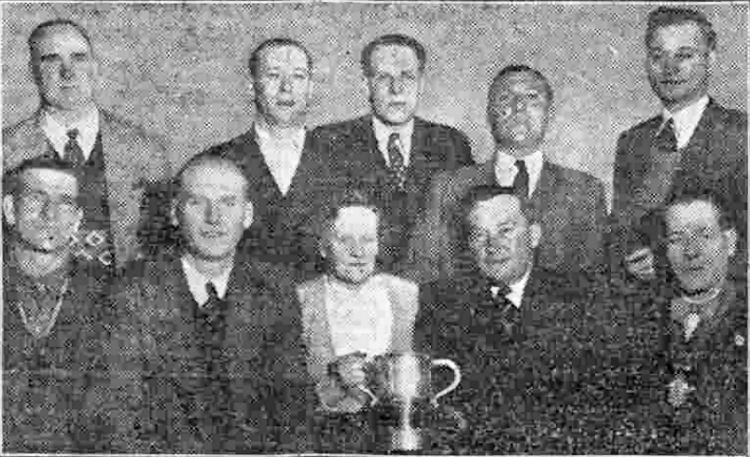
The "Cause is Altered" Dart Team, winners of the Dover Licensed
Victuallers' Cup for the second year running. (Standing): V. Godden, G.
Carter, E. Atkins, G. Page and V. Blythe. (Sitting): T. Page, H. Bishop
(captain), Mrs. Knott, H. Knott (licensee), A. Clayton, (Chairman, Dover
Licensed Victuallers' Association.) Runners up were the "Cherry
Tree."
|
|
From the Dover Express, 20 July 1951.
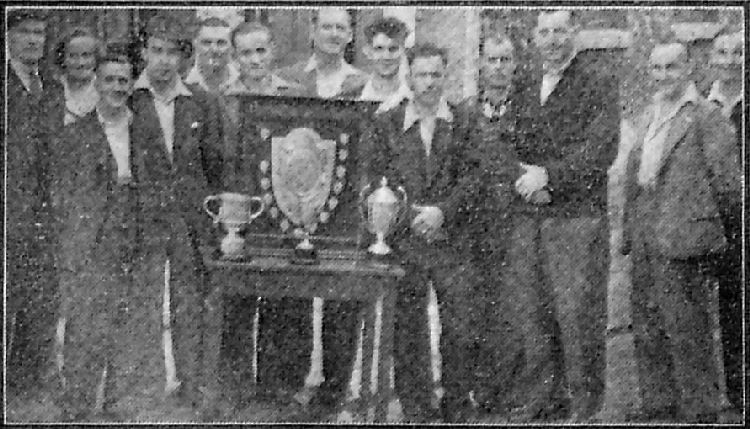
DARTS CHAMPIONS
The "Cause is Altered" darts team with the imposing
array of shields and cups won during the past year.
|
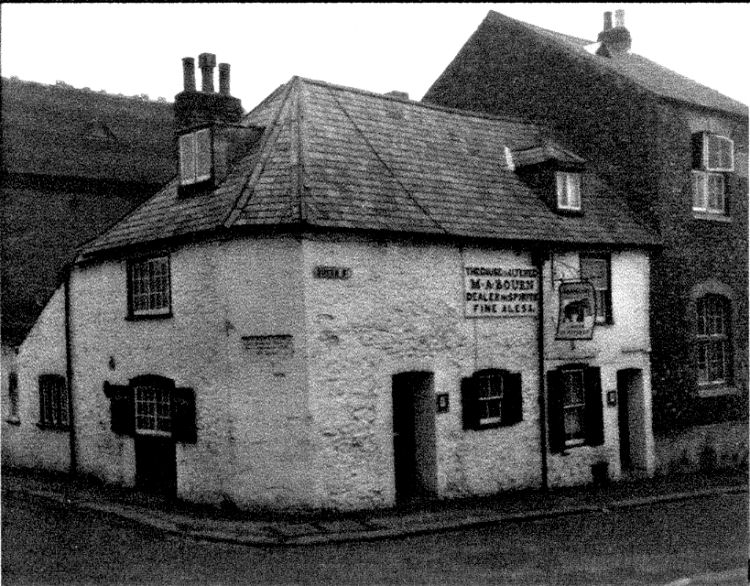
From the Dover Express 28 March 1969.
It was once a smugglers' haunt
SAD night on Saturday. Not only were they closing down another Dover pub
but it was the closure of the town's oldest pub. I managed to get in
among the drinkers at the ancient Cause is Altered in Queen Street as
the last pints were pulled. And it's not only those who enjoy a pint who
were sad to see this pub close down ready for the demolition men who
will be making way for a new road.
Take Miss Olive Rookwood, the former
teacher at the boys' county school, who now lives at the nearby Battle
of Britain Homes. She's no drinker but it made her sad this week to know
that yet another old pub had closed.
"It's very, very sad to see these places of historic interest being
pulled down. It's really dreadful. And they call it progress," she
lamented at her flat.
The date of this now closed hostelry is hard to fix. But there seems no
doubt that it was the oldest in town and was probably welcoming
customers three hundred years ago.
Like many of these old places the building is surrounded by legend and
gossip. They say it used to be the haunt of smugglers and when the
licensee Mr. Bourne in the nineteenth century decided to change the
house for
the better he also altered the name to The Cause is Altered.
For years I
was under the impression that the clock face on the ceiling of the
public bar, complete with ancient numerals, was a device to tip off
smugglers that the Excise men were about.
But no. Now I'm told by Mr.
Fred Simpson, of Markland Road - who works for Mackesons, the owners
- that the device was a primitive game of chance played by the customers.
Mackesons took The Cause is Altered over when they merged with Fremlins.
Queen Street won't seem the same again. I hope the stone set in the
wall commemorating Cow Gate will at least be saved and re-instated when
the authorities finally get round to building the York Street road.
Perhaps, despite the frenzy of the years ahead, passers by will have time
to stand and stare. And remember the pub. Perhaps.
|
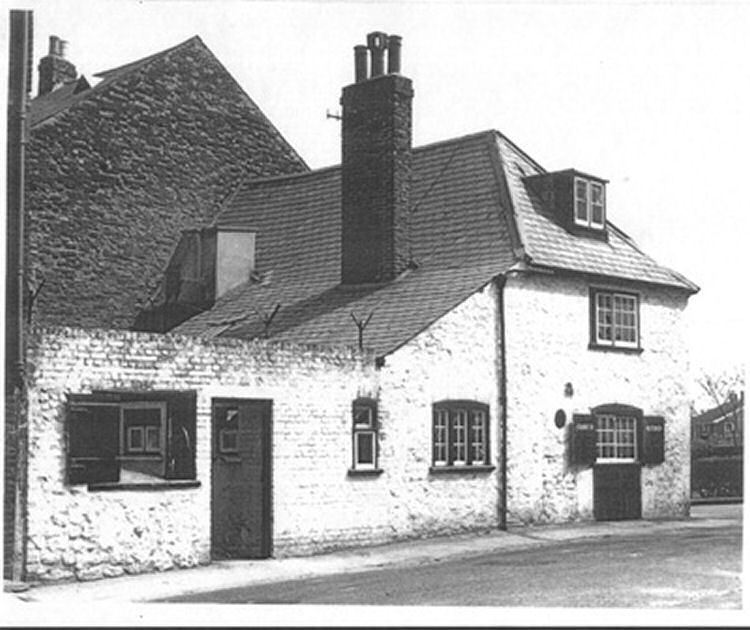
Above photo of the Cause is Altered side view circa 1970.
Taken from
Prince of Wales Sea Training School Society web site. |
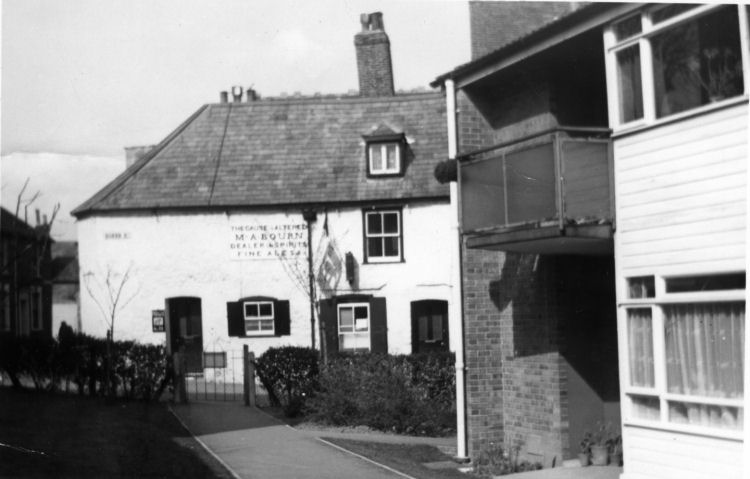 |
|
On the north side at the top of Queen street until it was needlessly
destroyed, as it turned out, to make way for the York Street dual
carriageway, stood an ancient inn, bearing the curious name "The Cause
is Altered." This house was just within Cowgate, and must have been
there long before that gate was removed. The name was in bold raised
letters over the door, and an old inhabitant told the author that he saw
that particular sign fixed there before he went to sea in the year 1826.
The sign of this house was originally "The Black Horse,"
(sic, it was the "Blacksmith's
Arms") and being
situate in a lonely spot on the walls, was a resort of smugglers, but
when Mr. Bourne took the house at the beginning of the nineteenth
century, he resolved to make a change for the better, and put up the new
sign "The Cause is altered."
Information taken from John Bavington-Jones' book "A Perambulation of
the Town, Port and Fortress of Dover", 1906. (Reprint in The South Kent
Gazette, October 31st, 1979.)
|
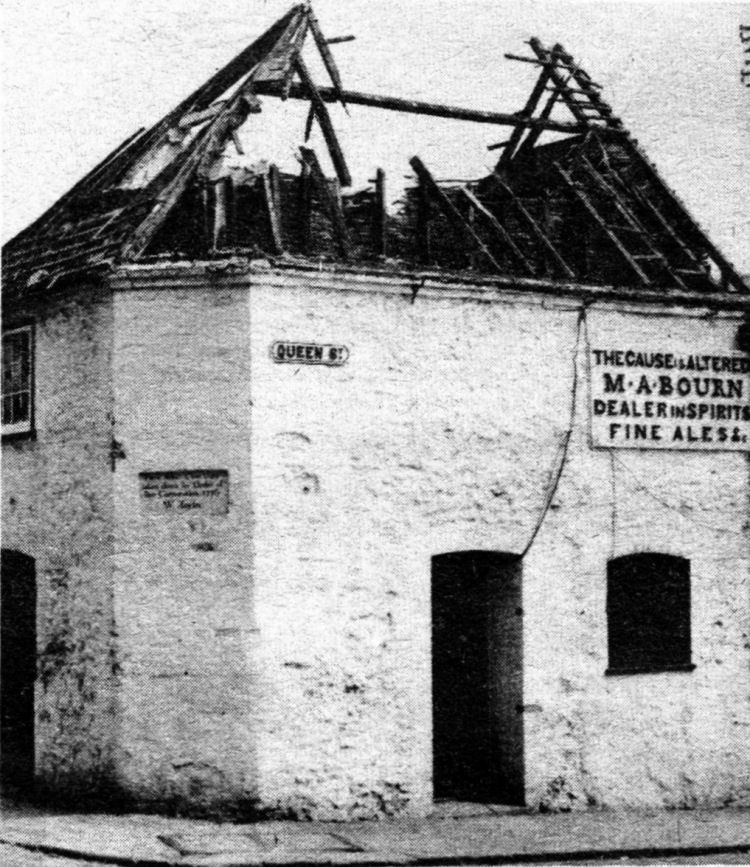 |
|
The Cause is Altered public house (pictured right) at the top of Queen
Street, was demolished in June 1971 to make way for the York street dual
carriageway. Because it was one of Dover's few surviving ancient
buildings and probably the oldest in domestic occupation, there was a
campaign to save it or preserve a remnant - such as a plaque on the
corner which recorded that "Here stood Cow Gate, taken down by order of
the Corporation, 1776." Next door was St. Mary's Infants' School which
was also demolished. |
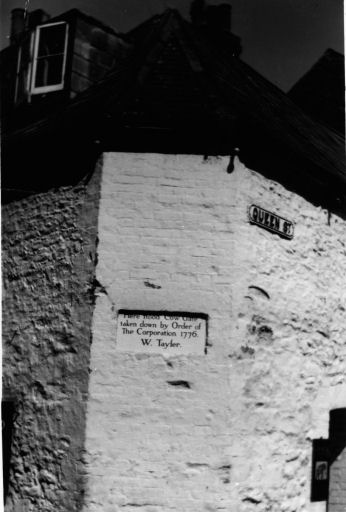 |
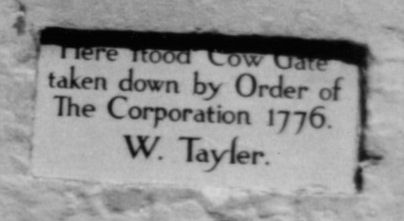
Various theories have been advanced concerning the name. Some thought it
was changed to appease Cromwell in 1649. Others suggested it marked its
end with the smuggling fraternity but perhaps more likely, the name
descended from "Cows and Halters". It is fairly certain that it was the
"Carpenter's Arms" in 1805 |
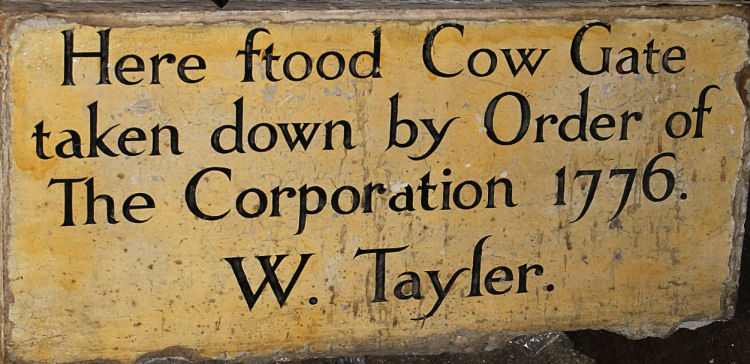
Present location (2013) unknown. |
|
From the Dover Express and East Kent News, Friday, 30
May, 1952.
Licensee Dies Suddenly
Taken ill suddenly on Thursday evening last week, Mr. Herbert Stephen
William Knott, licensee of the "Cause is Altered" Inn, Queen Street,
died within a few minutes of serving in his bar. He was 51.
Mr. Knott, who had been licensee for the past three years, joined the
Merchant Navy at the age of 15, and sailed three times round the world
before returning to his home town some years ago. He assisted a local
boatman in his piloting work, and retained an active interest in the
sea.
The first portion of the burial service was held at St. Mary's
Church, the Rev. A. S. Cooper officiating both there and at the
graveside. The mourners present were: Mrs. H. S. W. Knott (widow), Mrs.
M. L. Synes and Mrs. D. Smith (daughters), Mrs. C. Tinker (sister), Mr.
and Mrs. A. Knott (brother and sister-in-law), Mr. D. Smith
(son-in-law), Mr. J. Shephard (brother-in-law), Mr. S. Gumbrill
(cousin), Mr. A. Baldock (uncle), Mrs. M Matthews, Mr. and Mrs. R.
Brankley, Mr. and Mrs. T. McKee, Mr. H. Ware, Mr. F. Marsh, Mr. W.
Blackshear, Mr. J. Weir, Mr. T. Tooney, Mr. W. Brankley and Mr. M.
Shenton. Many friends were also present at the church and graveside,
including Mr. Alf Whiting (and representing Mr. Burwell's staff), Mr. F.
G. Wilson (Manager of Fremlins Ltd., Dover), Mr. A. W. Treadwell
(secretary, Licensed Victuallers), Mr. J. H. Weston (Treasurer, Licensed
Victuallers), Mr. L. R. Latcham, Mr. and Mrs. T. Allen, Mr. and Mrs. S.
T. Shenton, Mrs. Beal, Mrs. Holman, also representatives of the R.A.O.B.
and many customers and friends. Among the many floral tributes were
those from the Directors of Messrs. Fremlins Ltd.; Boat crews of Mr.
Burwills; Dart Club, Customers and Friends of the "Cause is Altered";
Officers and Bros., Royal Kentish Banners R.A.O.B.; Dover District
Licensed Victuallers Association; Dover Lifeboat. The funeral
arrangements were by Mr. B. J. Andrews, of 22 New St., and 2, Underdown
Road, Dover.
|
|
Theories on the change of name.
From Country Life 14th August 1969.
SIR,-This inn, The Cause is Altered, on the slope of the hills
leading up to the Western Heights at Dover, is shortly to be demolished
to make room for the new roadway leading from the docks to the A20. It
is believed to be Dover's oldest inn, and much speculation surrounds its
unusual name.
It is thought by some to have
originated from Restoration times, when Dover and east Kent generally,
having been very pro-Roundhead, suddenly found that the restored Charles
II was to land at Dover and make a triumphant journey through
the county. An opportunist landlord wished to make it quite clear that
he was now on the popular side. Could this be so; or are there other
inns of the same name with a quite different origin?
JOHN MANNERING, River House, River, Dover, Kent,
From The Dover Mercury 29 October 1998.
WE know the name of Dover hostelry the Cause is Altered was changed in
1826 because it had a bad reputation due to its links with smuggling. So
the new landlord, Mr Bourne, decided to give it-a new image.
I have a list of names of Inns from about 1792. We also know there was a
"Blacksmith Arms" in Queen Street in 1824. Mr Bavington Jones in his book
on Dover said he was told by a sailor that it was the Black Horse, but
there was already an Inn of that name where "The Eagle" now stands.
There has been a suggestion it was linked with the Cavaliers and
Roundheads, but the change would have needed to be much earlier.
I
discovered, however, there was a Cause is Altered in Ipswich which could
go back to the Civil War period.
When visiting that city, walking up a long road, I found the pub
which was a fairly modem building and they had changed the name to the
Case is Altered, with the sign showing a bewigged judge.
In the early 19th century there could have been a steady trade between
these two ports and this may have been a suggestion by a regular
seafaring customer.
Joe Harman.
|
|
The last drinks were served on 22 March 1969. Some local groups would
have liked the walls left standing but the authorities decided in September
1972 that the whole must come down. |
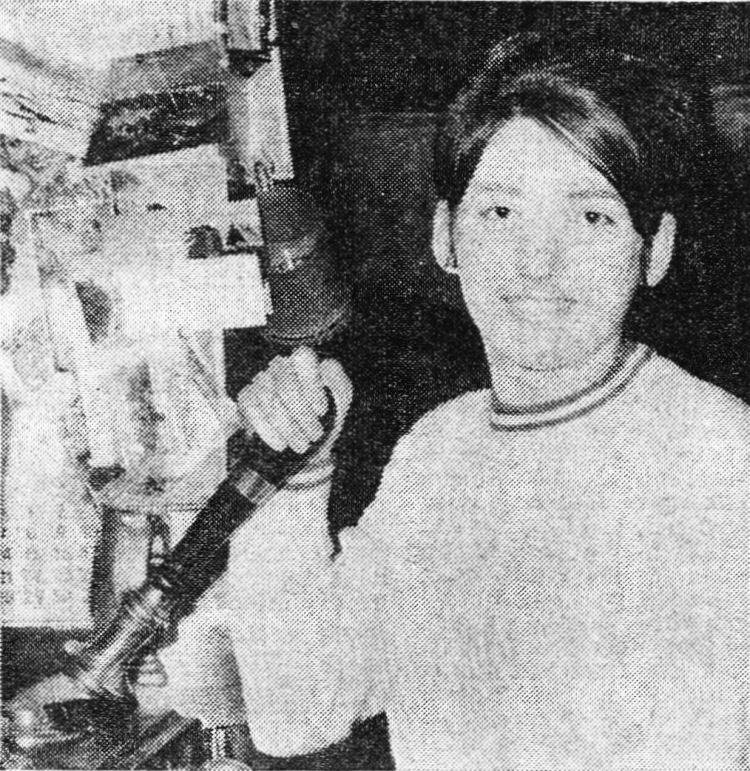 |
|
Nineteen-year-old Dixie Smith, daughter of the landlord, pulls a pint
... one of the last.
Dover's oldest
pub to close
DOVER'S oldest public house, the Cause is Altered in - Queen Street,
closes its doors for the last time on Monday night (21 March 1969). The building is
coming down to make way for the new York Street by-pass.
Once the haunt of smugglers the pub used to be The Black Horse
(sic, it was the "Blacksmith's
Arms") but its
name was changed in the eighteenth century. Dover citizens and pressure
groups tried to save the pub but failed to persuade the planners. Now
licensee Mr. Don
Smith, who has been at the Cause is Altered for 14 months, is to take
another pub at Maidstone. It is hoped to save the ancient stone set in
the wall, marking Cowgate, and to reinstate it when York Street is
built. |
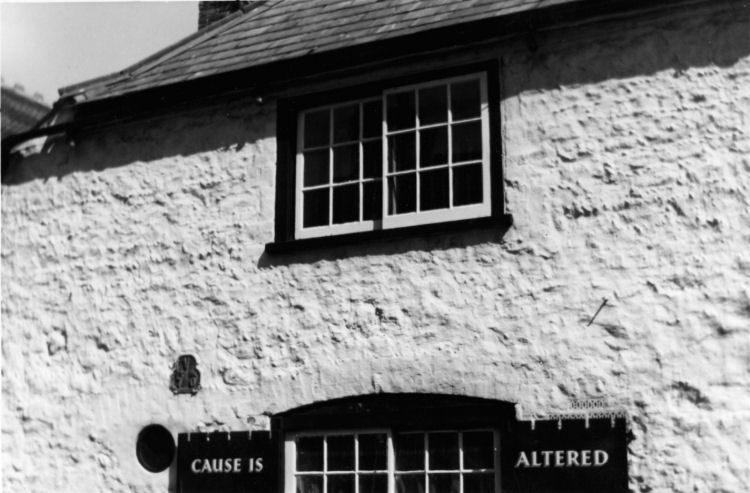
|
|
From the Dover Express, 4 June, 1971.
END OF A WELL-KNOWN PUB
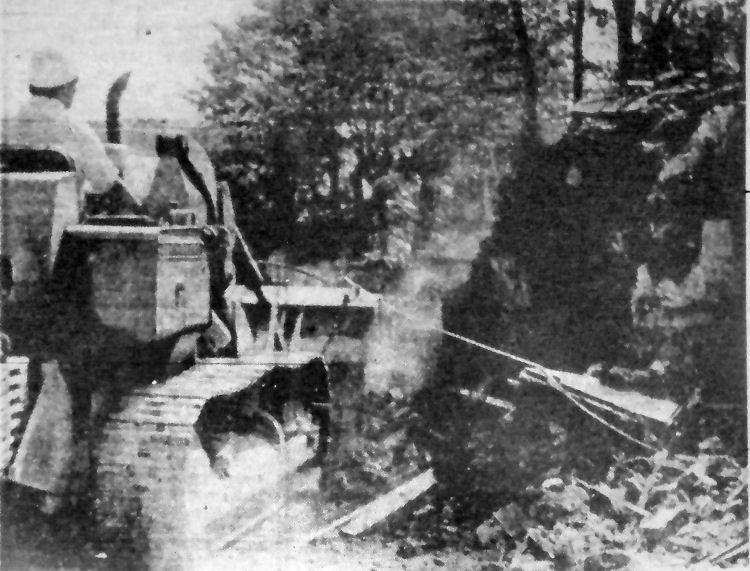
The last remains of the "Cause is Altered" public house in Queen
Street crash to the ground to make way for the York Street by-pass due
to be constructed later this year. The pub was the oldest in Dover and
there had been a move to prevent its destruction but the fight was given
up.
|
|
From the Dover Express, 24 September, 1971.
Not all the ancient "Cause is Altered" public house is to be
destroyed after all. Following the intervention of members of the New
Dover Group, the most interesting corner of the pub's walls - where the
old Cow Gate once stood - is to be retained.
The Group is hoping the wall - at the corner of Queen Street and
Princes Street - will become a feature of the redeveloped area near the
York Street dual carriageway, now under construction.
At one stage it was hoped to save the building; then it was proposed
that it should be razed to the ground.
But when it was realised the new road would not destroy all the
public house, members of the New Dover Group went into action and mad
emergency repairs.
SUN TRAP
Later, after work on the nearby Roman remains has been completed,
they propose to smarten up the wall be removing the window surrounds and
the doors.
Two former Mayors, Alderman William Muge and Alderman George Aslett,
helped with the work.
Future plans - and that is all they are at this stage - are to lay
out the area as a garden with a wall acting as a windbreak and sun-trap.
Possibly something from the Roman fort can be saved and incorporated.
There are already firm proposals to replace the poet Churchill's
grave near where he was buried later on. The "Cause is Altered" was the
oldest public house in Dover - and probably the oldest domestic dwelling
in town. Legend claims it was once a smugglers haunt.
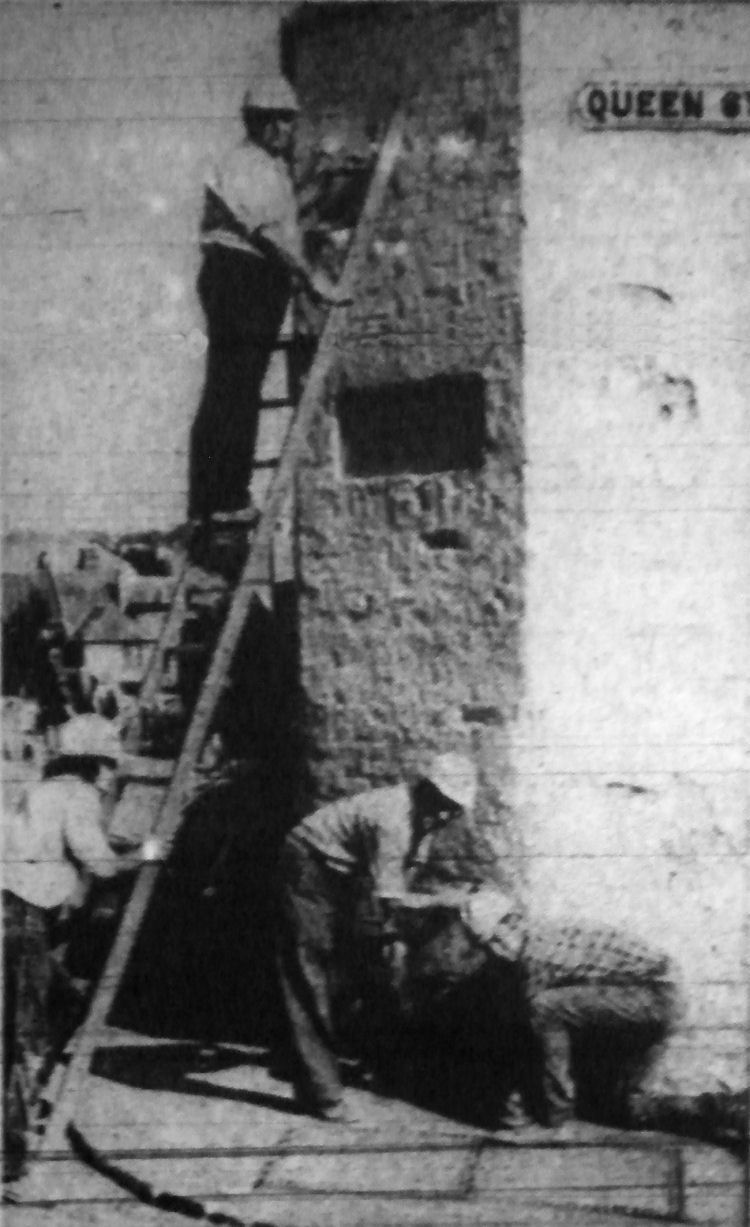
New Dover Group volunteers making safe sections of the remaining
parts of the "Cause is Altered" public house. Leader of the team is Mr.
John Gaunt, of London Road, Deal. With him are Mr. Doug Crellin, of
Laurestone Place, Dover (chairman of the history committee of the New
Dover Group), and group members Chris Reed (17), of Millais Road and
Wesley Harcourt (16), of Percival Terrace both at Dover Grammar School. |
The walls contained two plaques which may well have been preserved. It
was said at the time that the site was needed to house one end of a
pedestrian bridge and on that assumption the demolition was authorised by
Dover Corporation in March 1973; By August of 1991, as I retype this page
little of interest has yet materialised on the site.
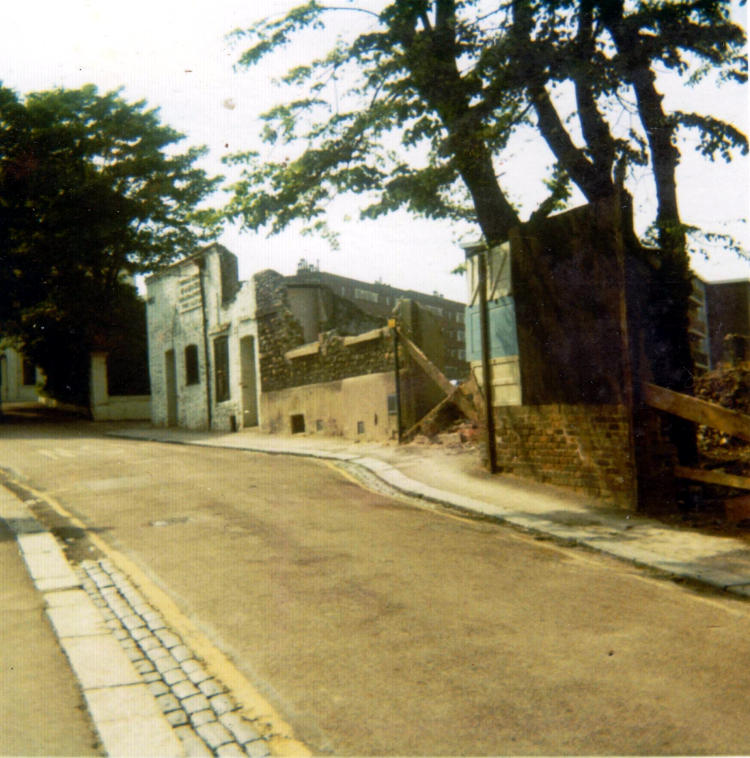
Above photo, circa 1972, kindly sent by Phil Eyden. |
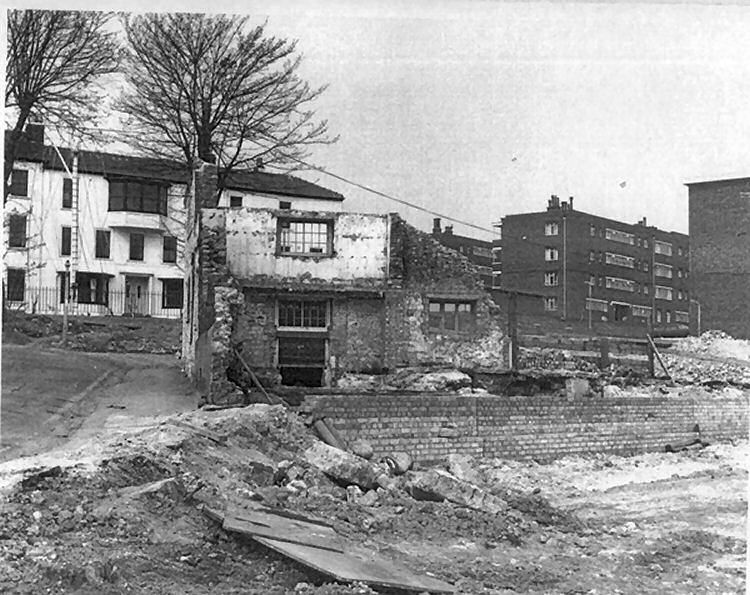
Above the Cause is Altered almost down 1972.
Taken from
Prince of Wales Sea Training School Society web site.
|
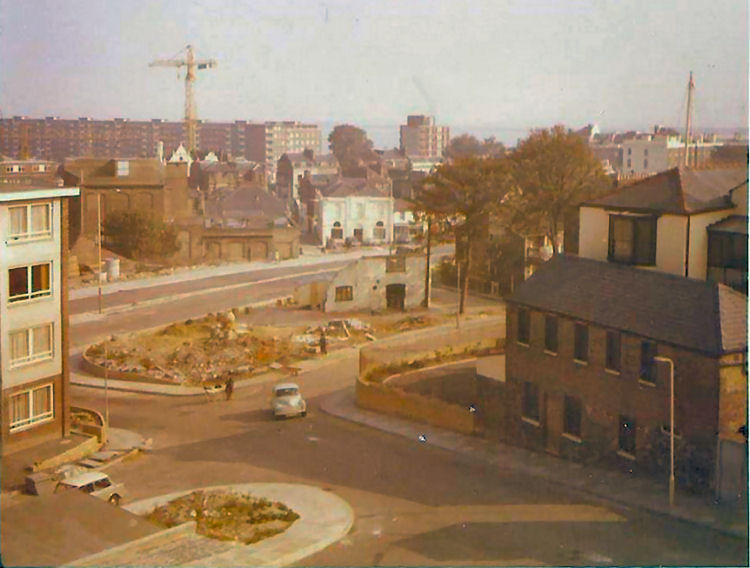
Above photo kindly sent from Mark Jennings who says:- I've unearthed a
pic seen from Durham Hill from my great uncle Aubry Pemble that shows
"The Caused is Altered" being knocked down when Burlington House
building was under construction in 1972.
|
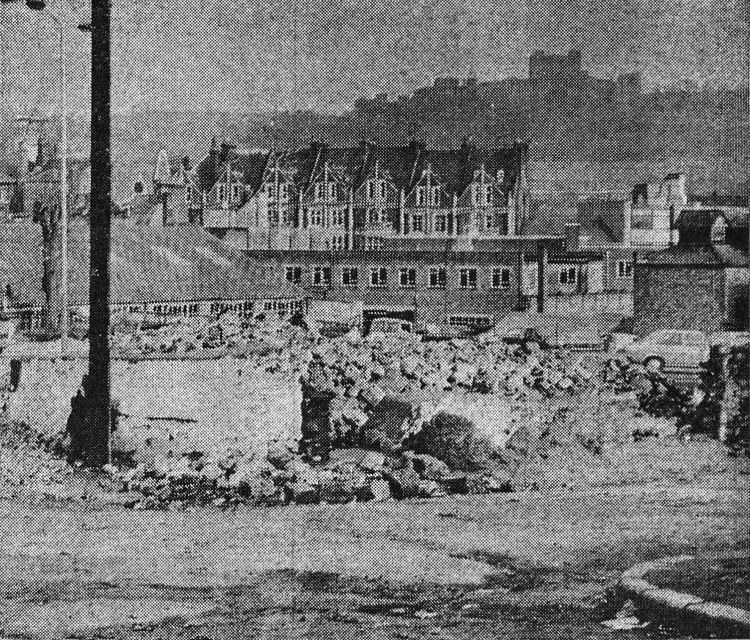
Site of The Cause is Altered in 1973. |
|
From the Dover Express 9th February 1973.
Ancient link with past not worth preserving - say residents
GET rid of them. That's what local people are saying about the remains
of the Cause is Altered public house by the side of the York Street
trunk road. But there are plans to preserve the walls, and to grass the
surrounding area so that people can sit there.
"It will become a public convenience for hitch-hikers," said Mr. George
Austin, of the Battle of Britain Homes which stand next to the site.
Putting seats there and grassing the area over will simply be an
invitation to them to spend the night there, or use it as a toilet."
Mrs. Bessie O'Connor, who also lives in one of the flats there, thinks
the land could be better used by making a pathway down to the new road.
"At the moment, all us old
people from these flats have to walk around that site, and then down on
to the road.
"It might not be very far if you're young and fit, but when
you can't walk very far anyway, it's almost impossible."
Her husband,
Mr. Frank O'Connor, is unable to make
the journey.
"It would be much better to have a path leading down there on to the
pavement. Who wants to remember an old pub anyway? I can't
stand the places."
Folkestone Road resident Mr. Herbert Jackson, said he wouldn't mind
the walls being preserved if they were original.
"But they're not," he said. "They've been patched up a couple of times,
and there's even some brick work in them, so they're not exactly old."
Mrs. O'Connor suggested that if they wanted to mark the spot where the
Cow Gate once stood - as a plaque in the pub wall used to do - they should
include that on a gate there.
Meanwhile, the subject is likely to be raised again at the next Works
Committee meeting of the council.
|
|
From an Email received 8 May 2011.
ANOTHER THEORY ON THE NAME.
The origins of the pub name "The Cause is Altered" may have come from
the phrase in Spanish "La casa en las alturas" which translates as "the
house in the heights."
Or possible from the phrase "La casa de alta" which translates as "the
house of high." (Another literal
translation from Spanish to English for that phrase could be 'The house
of discharge.' I wonder whether the Spanish soldiers could pick up their
military discharge papers from here at one time? Paul Skelton)
I was told that the Cause is Altered in Dover was at the top of a hill.
The soldiers of Wellingtons army (1817) would have come back from the
Peninsular war with Spanish phrases - they were in Spain long enough to
learn the language from their Spanish allies.
Regards,
Lyndon Wainwright.
|
LICENSEE LIST
WATTS Andrew 1832-39+
 
BOURNE James "John" 1840-20/Sept/46 dec'd (age 40 in 1841 ) )

BOURNE Mrs Mary Ann 1847-Mar/67 (widow age 63 in 1861 ) )
  
FLETCHER 1867?
PREBBLE Thomas William Philpot Mar/1867-74 (age 55 in 1871 ) )

PREBBLE Mrs Susannah 1882-91
 
PREBBLE Miss Ellen 1891-99 (age 30 in 1891 ) )
  
PREBBLE Mrs Grace Ellen 1901
BOURNE Richard Reeve 1903-Sept/14 (age 43 in 1911 ) )
    
 NORRIS Albert George Sept/1914-26 end
NORRIS Albert George Sept/1914-26 end
  
BALLARD Albert Thomas 1926-Feb/32
 
HARPER Alfred Harold Feb/1932-Oct/40
 (age 55 in 1939)
(age 55 in 1939)
    (Late of H. M. Forces)
(Late of H. M. Forces)
FULLAGER Arthur Edward Oct/1940 (Brewer's manager)

MARSH Frank S R 1943-June/49

KNOTT Herbert Stephen William June/1949-52 dec'd
  (Ex-merchant Naval Officer)
(Ex-merchant Naval Officer)
KNOTT Mrs Rosina 1952-53+

JONES Mrs A 1956-63 dec'd

SMITH David 1959-68 end
SMITH Donald G 1968-69 end
 From the Pigot's Directory 1832-33-34 From the Pigot's Directory 1832-33-34
 From the Pigot's Directory 1839 From the Pigot's Directory 1839
 From the Pigot's Directory 1840 From the Pigot's Directory 1840
 From Bagshaw Directory 1847 From Bagshaw Directory 1847
 From Melville's Directory 1858 From Melville's Directory 1858
 From the Post Office Directory 1874 From the Post Office Directory 1874
 From the Post Office Directory 1882 From the Post Office Directory 1882
 From the Post Office Directory 1891 From the Post Office Directory 1891
 From Pikes Dover Blue Book 1895 From Pikes Dover Blue Book 1895
 From the Kelly's Directory 1899 From the Kelly's Directory 1899
 From the Post Office Directory 1901 From the Post Office Directory 1901
 From the Post Office Directory 1903 From the Post Office Directory 1903
 From the Kelly's Directory 1903 From the Kelly's Directory 1903
 From Pikes Dover Blue Book 1909 From Pikes Dover Blue Book 1909
 From the Post Office Directory 1913 From the Post Office Directory 1913
 From the Post Office Directory 1922 From the Post Office Directory 1922
 From Pikes Dover Blue Book 1923 From Pikes Dover Blue Book 1923
 From Pikes Dover Blue Book 1924 From Pikes Dover Blue Book 1924
 From the Post Office Directory 1930 From the Post Office Directory 1930
 From Pikes Dover Blue Book 1932-33 From Pikes Dover Blue Book 1932-33
 From the Post Office Directory 1938 From the Post Office Directory 1938
 From Pikes Dover Blue Book 1938-39 From Pikes Dover Blue Book 1938-39
 From the Kelly's Directory 1950 From the Kelly's Directory 1950
 From the Kelly's Directory 1953 From the Kelly's Directory 1953
 From the Kelly's Directory 1956 From the Kelly's Directory 1956
 From the Dover Express From the Dover Express
|




























